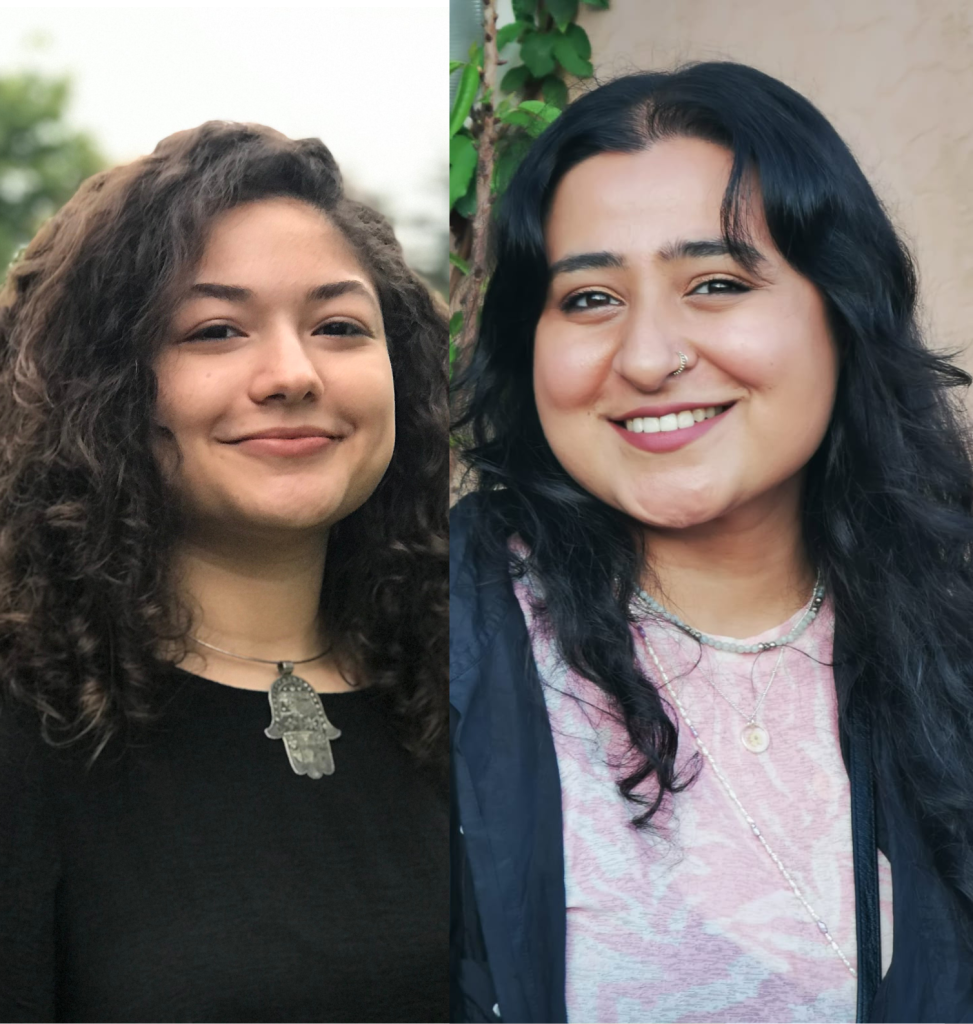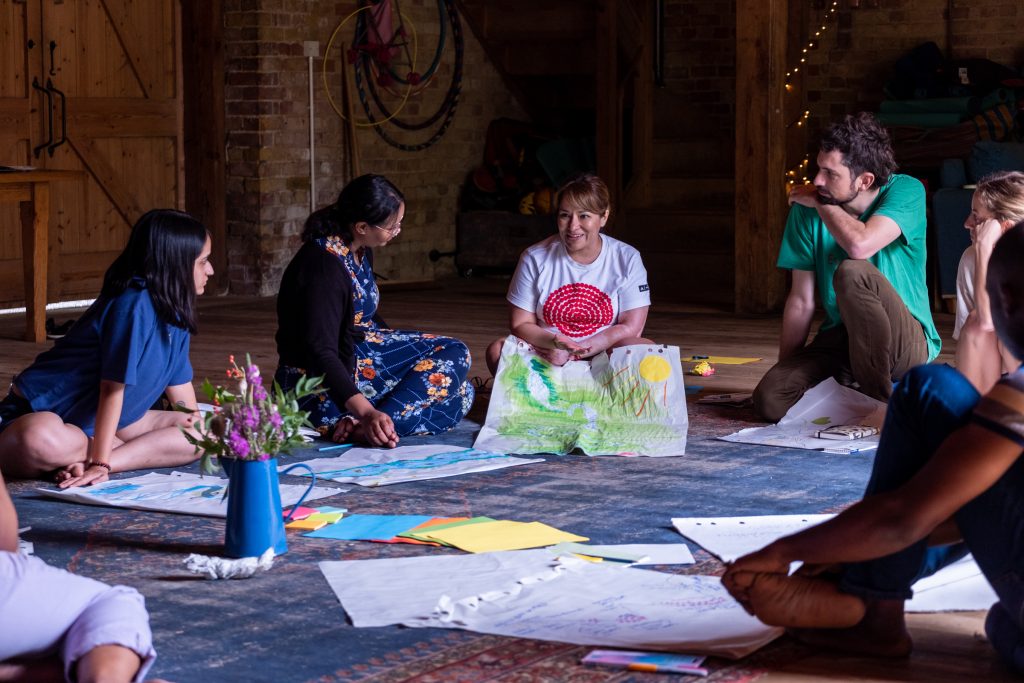This is the fourth in a series of Q&As we are publishing with our innovation challenge winners. From their experiences in the incubation and co-learning programme, they have gained unique insights into operationalising their ideas and approaches in the real world and overcoming challenges in the conservation sector. Each interview will capture their inspiring journeys towards disrupting the conservation status quo, shaking things up and making a difference in the conservation space for more regenerative and equitable futures.
If you missed the first two interviews, you can read them here, here and here.
In focus: Samirah Siddiqui and Tasnim Elboute
Project title: Project In/Visibility
Themes: Challenging dominant narratives
Lens: A world where conservation work is locally focused and locally led (proposition 7 in our report ‘Exploring possible futures for conservation NGOs’)
Pathway: Empowering local community actors
Samirah and Tasnim seek to challenge the dominant conservation narratives by introducing new perspectives and lived experiences from the very heart of communities, placing them in the spotlight of attention. This initiative extends its influence from educational institutions to prominent conferences. They aim to establish connections between academia and non-governmental organisations, thereby amplifying the voices that advocate for social and ecological justice.
During our postgraduate studies, we realised that conservation curricula, while they list and emphasise many drivers of environmental degradation, tend to overlook the significant social issues, such as inequality and colonialism, as key drivers of modern-day conservation issues. Professors discussed these challenges as if they occurred in isolation, often using vague language and describing the violation of planetary boundaries as a euphemism for colonial activity. Voices of those who have historically been leaders in environmental justice were absent. Further, we think that the ongoing solutions are often incompatible with the environmental approaches of Indigenous and local communities. Where are the subaltern perspectives?

Our experience showed that we live in a world where power remains fully entrenched in Eurocentric knowledge and firmly consolidated in the classroom. This sparked our passion for amplifying alternative narratives and building a community where the stories and experiences of those at the forefront of environmental change are heard.
The omission of different and plural voices from curricula presents a challenge for the future of conservation. This issue is exacerbated by the fact that leading conservation NGOs primarily hire university graduates disconnected from decolonial and diverse conservation narratives who end up reinforcing existing power dynamics and perpetuating neo-colonial conservation approaches.
To address this challenge, it is important to include and centre different and plural voices, from around the world in the university curricula. Doing so will help shift the narrative beyond neo-colonial efforts and improve conservation in practice. Project In/Visibility seeks to mainstream alternative narratives and break down silos in academia, leading to richer and more nuanced understandings and conservation practices rooted in local realities. We believe that universities have a unique opportunity to integrate diverse narratives of conservation experiences into their curricula and to provide students with a chance to engage with these perspectives before they enter the workforce. This approach will help cultivate a more nuanced leadership that embraces complexity and ensures a more inclusive and effective conservation practice.
Project In/Visibility is dedicated to building a just and equitable future for the planet through the power of storytelling. Rather than being a ‘voice for the voiceless’, our platform aims to ‘pass the mic’ to those whose voices have been unheard. We will gather, document and share stories from the forefront of social and ecological justice, focusing on locations most impacted by social and environmental challenges. The aim is to collectively shift the dominant narratives in conservation discourse, starting with academia and NGOs, and eventually reaching the communities and lands most impacted by these challenges.
Project In/Visibility is an evolution of Project Myopia, a platform that amplifies diverse voices in the arts and humanities. Drawing from the success of Project Myopia, we seek to apply a similar approach to conservation narratives, enabling a broader range of perspectives to shape the future of conservation.
Our main challenge is working for a small NGO with an ambitious programme. The development of Project In/Visibility is just one of the many initiatives we are currently working on to support flourishing environments and communities. While it is a strength for our project, as it aligns with our other programming, it remains a challenge for our small team with limited resources to do it all.
Another essential challenge is building and nurturing our relationships with environmental change makers who are sharing their stories through Project In/Visibility. We want to ensure a dynamic relationship that sustains ongoing collaboration and dialogue rather than having the engagement end after the publication.

The incubation and co-learning programme played a vital role in providing us with the necessary structure and support to bring our ideas to life. In the first phase, we engaged in a series of workshops that laid a strong foundation for our work. During this initial phase, we developed our theory of change and raised thought-provoking questions that encouraged us to develop this platform ethically and intentionally. The continued support from Unearthodox and Impact Hub in the form of tailored mentoring has been especially helpful, as it provided a space where we could bring together our combined resources, knowledge and expertise to build this platform.
On a personal level, we are all individually passionate about changing and improving the conservation sector. Being one of the innovation challenge champions and having our ideas heard and recognised has been a validating and empowering experience.
Don’t be afraid to ask for help! Project In/Visibility aims to break down silos and encourage exchange between different yet related academic disciplines; this can only be achieved through collaborative action and cannot be achieved in isolation.
It has been great to see that other organisations, individuals and leaders in conservation recognise the need to change the dominant narrative and make conservation discourse and academia more inclusive and reflective of realities on the ground. This was evident from initiatives such as RINGO and panel discussions with thought leaders in this field. These developments make us more optimistic about intentional and pragmatic change in the conservation sector
Our first anthology of conservation narratives will be on the themes of Biodiversity & Livelihoods. We aim to publish this by the end of 2023!
To find out more about Project In/Visibility please visit:
global-diversity.org
Instagram
Facebook
Youtube
LinkedIn
To find out more about Project Myopia please visit:
projectmyopia.com
Instagram
Twitter (X)
Facebook
Approach: Empowering marginalised voices through storytelling to reshape conservation discourse and challenge dominant narratives
Model: Collaborative storytelling platform shifting focus from 'voice for the voiceless' to 'pass the mic', amplifying unheard stories from social and ecological justice frontlines
Leadership: Inclusive and transformative, fostering equitable representation
The content of this interview represents the authors' own views and does not necessarily represent the views of Unearthodox or the Future of Conservation NGOs project.